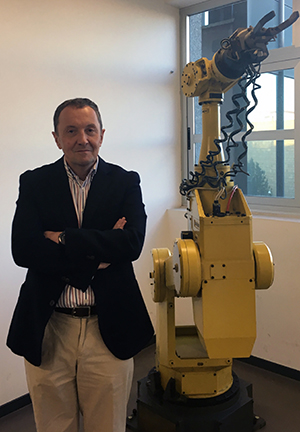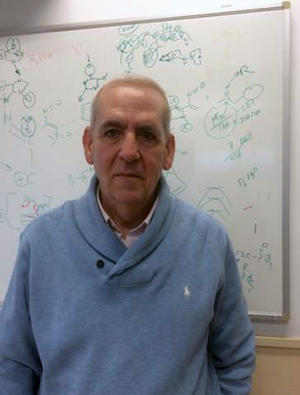 Norberto López de Lacalle is a Professor from the Department of Mechanical Engineering at the UPV/EHU and has over 20 years of experience writing expert reports for industrial-related cases.
Norberto López de Lacalle is a Professor from the Department of Mechanical Engineering at the UPV/EHU and has over 20 years of experience writing expert reports for industrial-related cases.Expert reports are documents drafted by an expert in order to serve as evidence in a trial. Whenever two parties enter into a legal dispute over an issue with a strong technical component, one of the most important pieces of evidence that judges, prosecutors and lawyers consider are expert reports. Their purpose is to explain the more technical issues of the case in such a way that the different parties, lacking such expertise, can understand. The experts are financially compensated for the time spent writing reports and professional experts exist in some fields.
University professors are highly regarded as experts for several reasons. First, they earn a living teaching and therefore their economic livelihood does not depend on serving as an expert witness, which lends them a greater degree of credibility. Secondly, they provide a thorough understanding of the technical field and are skilled at transmitting information in such a way that an issue can be understood. And thirdly, they are able to issue reports on complex issues and issues without previously established standards.
Many expert reports deal with patents and industrial issues, yet lawyers and the courts turn to universities in search of all kinds of expert witnesses. “Recently”, notes Aitziber Conde from the Euskoiker Foundation, “we had a request for information from the field of zoology and cell biology to issue a report on the identification of arthropods associated with furniture in a private home”. While practically any area of expertise could be called upon to provide an expert report, some are more common than others.
Through the Euskoiker Foundation, professors at the UPV/EHU can write these types of reports just like other knowledge transfer activities. The client can be a company or an individual who requests a report on a specific topic to use as evidence in a trial. We will answer some of the questions that are frequently asked about expert reports below.
Expert reports are fully professionalized and standardized in some fields, like the assessment of permanent bodily impairment, for example. There are a number of tables, so it makes sense to look to a university expert for a report. The expert reports requested from universities are usually extremely specific and for complex cases for which no previous standard exists.
Norberto López de Lacalle, Professor from the Department of Mechanical Engineering, spoke to us about the industrial field. “Most expert reports can be classified into four groups: reports on patent compliance, noncompliance or validity, reports on noncompliance with the requirements of a particular machine that has been supplied, reports on compliance with legal regulations and a fourth group that could be called forensic engineering or clarification of claims”.
 Francisco Palacios is a Professor of Organic Chemistry at the UPV/EHU School of Pharmacy and he has participated in numerous trials as an expert witness in the field of pharmaceutical patents.
Francisco Palacios is a Professor of Organic Chemistry at the UPV/EHU School of Pharmacy and he has participated in numerous trials as an expert witness in the field of pharmaceutical patents.Of these groups, the most common reports are related to industrial patents and property. A patent is a set of exclusive rights that a State grants to the inventor of a new product or technology in exchange for an invention disclosure. Patents typically specify a limited period in which the patent holder has exclusive commercial rights to exploit the invention. A dispute may arise because a patent holder believes that their rights are being infringed upon, or, conversely, a company that wants to make use of a patent in force may try to prove that the patent is invalid or that the production process does not use the patent.
For a patent to be protectable by law it must be new when compared with the previous state of knowledge and must be inventive, that is, not completely obvious to an average field technician. Typically, expert reports relating to patents attack or defend either of these two points.
Patent-related disputes are also extremely typical in the pharmaceutical field. “A frequent conflict typically occurs between innovative pharmaceutical companies and generic producers”, says Francisco Javier Palacios, Professor of Chemistry in the School of Pharmacy. “The first make significant efforts to investigate new drugs and try to protect their investment with patents. These companies often request reports proving that one of its patents has been infringed upon or to defend the validity of its patent against someone who wants to use a similar process. On the other hand, generic producers also request reports to prove that a patent is poorly described, invalid or that a particular case does not fall under the scope of protection, in an attempt to revoke the patent”.
Another major category of reports in the industrial field deals with compliance with machinery requirements. Experts can be asked to determine whether a machine meets the requirements described in the order. The implicated parties are usually the selling company and buying company, and the report is requested to determine economic responsibility when a machine fails to meet with expectations.
Likewise, a number of reports deal with the legal regulations governing the export of sensitive knowledge or machines that can have a dual use (military and industrial) to countries under embargo under EU law (Iran, Russia and North Korea).
A final type of report deals with the clarification of claims in the industrial field. When, for example, a crane falls or another type of accident occurs, a trail is held to determine the parties responsible for damages. The fault could lie in the machine design, a lack of maintenance or inadequate handling, among other explanations. Typically, each party in the case will hire an expert to defend its position. “These types of reports are called forensic engineering because they attempt to reconstruct the past from available evidence”, says Norberto.
The clarification of claims is also common in the maritime field. When there is a collision (between boats), a collision with the dock or a load that crashes, for example, trials are often held to determine responsibilities. “The cases that require a university expert are usually not simple”, says Fernando Cayuela, Merchant Marine Captain and professor at the Portugalete Nautical School. “There are many companies and professional experts in this field, so if a case requires a university expert it is typically a complex one”. These cases can also involve the CIAIM (Commission of Inquiry into Marine Accidents and Incidents), a collegial body under the Ministry of Public Works that officially investigates serious maritime accidents or those which can serve as a lesson to learn from. However, one of the parties often disagrees with the conclusions of the commission and hires its own expert.
Although these are the most common types of expert reports in the industrial, pharmaceutical and maritime fields, there are other reports that relate more to business processes, brand protection, marketing...even, as mentioned, cases related to zoology.
The three basic requirements for an expert are “profound knowledge of the technical field, impartiality and ability to synthesize”, according to Norberto. Profound knowledge is the basic requirement, since the expert is being asked to analyze a situation from a technical perspective.
Impartiality is also a crucial component, because the law requires that the expert stick to the truth, even if it goes against the party who pays for the report. “In practice”, explains Norberto, “t is normal that if you are going to issue a report against to the interests of the party who is paying for it, let them know and simply say no to the job”.
Finally, an ability to synthesize information is fundamental because the report should be as brief and clear as the complexity of the issue allows. Norberto says that, in his field (industrial), “only one in five expert reports require that the expert later testify in court, but if you do you must be able to be brief and clear enough to explain the case so that judges and lawyers can understand”.
Francisco Palacios added that, in his field (pharmaceutical), “the expert typically has to testify in court and the ability to synthesize and express themselves verbally in a very clear way for lawyers and judges is therefore crucial. Similarly, the expert must be able to project an image of professionalism and seriousness”.
Fernando Cayuela told us that in the maritime sector, “although there are no mandatory requirements, being a Merchant Marine Captain boosts credibility by ensuring that you have a significant amount of hours on board a ship, which says a lot about the criteria you might have for issuing reports on ship incidents”. As a result, each field of knowledge can have its own specific requirements but, as Fernando comments, “the most important thing is that the expert has an interest in the field and constantly learns more. Plus having the common sense to apply this knowledge”.
 Fernando Cayuela is a Captain from the Merchant Navy with a PhD in Navigation and Maritime Transport. He occasionally receives requests to provide expert reports on boat collisions and other accidents at sea.
Fernando Cayuela is a Captain from the Merchant Navy with a PhD in Navigation and Maritime Transport. He occasionally receives requests to provide expert reports on boat collisions and other accidents at sea.First, the expert is expected to write an extremely clear report than can be easily understood by lawyers and judges.
Secondly, in some cases the expert must testify in court, defending his or her report and explaining it to lawyers and judges. “There’s no need to be nervous, even though it’s a trial”, Norberto points out, “because it is not the expert who is on trial. All you have to do is clearly explain what is written in the report and answer any questions you are asked”.
The lawyer of the opposing party will then try to discredit either the report or the expert. The expert must remain calm and defend the position developed in the report.
Typically, the contract signed with the expert includes payment for the report itself and another amount for testifying at the trial (including travel, expenses and other applicable fees) if that eventuality occurs.
First, these are knowledge transfer projects and are valued as such in a range of competitive bids.
Secondly, experts are compensated, with payment depending on the type and complexity of the report. Experts in some fields are better paid than those in others, however, cases that require university experts are generally complex and the corresponding payment reflects that complexity.
Thirdly, the professors interviewed pointed out the positive effect that writing expert reports has had on their own personal development. “When I have to write a patent on my research”, says Norberto, “I can draw on real experience of how these patent lawsuits are really argued. The way I write patents now has nothing to do with how I did it before becoming part of this world”.
Writing expert reports “helps me keep abreast of what is happening in the pharmaceutical industry, which allows me to expand my professional horizons beyond teaching and research”, says Francisco, “and taught me a lot about the world of patents and how they work in practice”.
“It allows me to stay in contact with the maritime world and drives me to keep learning and watching the latest trends”, says Fernando. “It’s also highly entertaining”.
Do you need an expert? Contact us
What is the benefit of contracting projects with companies?
¿Cómo puedo contratar proyectos con la Universidad?
Euskoiker has more than 30 years of experience managing all kinds of projects